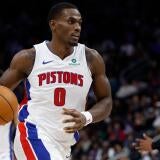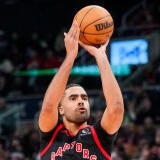
2019 NBA Finals: Raptors have reasons for confidence and concern as they enter Warriors' territory
What the Raptors should and shouldn't be worried about heading into Game 3 in Oakland
The Toronto Raptors lost home-court advantage in the NBA Finals, just like that. They had a double-digit lead in the second quarter of Game 2 on Sunday, and perhaps that cushion made them too comfortable. A pair of Stephen Curry free throws made it a five-point game at halftime, and the Golden State Warriors scored 20 straight points in a flash. Despite some stifling (and unconventional) Raptors defense down the stretch, Golden State held on and tied the series.
After the Warriors' latest gutsy win, Toronto wing Danny Green lamented that his team wasn't sharp enough in the third quarter and that allowed the defending champions to stick around after sending them to the free throw line before that. The loss served as a reminder that lulls and lapses are not acceptable against Golden State.
"It seemed like we were kind of sloppy and kind of forgot how to play basketball for a second," Green said.
As the Raptors focus on turning things around in Game 3 in Oakland on Wednesday, let's have a look at what they should and shouldn't feel good about in this matchup.
Golden State desperately needs both Splash Brothers on the court
Nick Nurse busted out a box-and-one defense against Curry at the end of Game 2, and it almost won Toronto the game. That bold move, however, was just an extreme version of what Toronto had been doing throughout the first two games. Whenever Curry or Klay Thompson has been on the bench, the Raptors' defense has been suffocating:
| MIN | ORTNG | DRTNG | NET RATING | FG% | 3PT% | EFG% | |
Steph and Klay | 56 | 114.3 | 110.9 | 3.4 | 49.0 | 44.4 | 57.0 |
Steph without Klay | 24 | 96.2 | 102.0 | -5.7 | 37.1 | 25.0 | 42.9 |
Klay without Steph | 15 | 103.3 | 126.7 | -23.3 | 40.0 | 38.5 | 50.0 |
As the Warriors showed during their third-quarter run, they can create good looks without pristine spacing. When a defense is obsessed with preventing Curry and Thompson from getting open, backcuts can be deadly. Both of them could make their teammates better simply by standing still 28-30 feet away from the basket, but they make their teammates way better with their movement and screening. If there is only one of them doing that stuff, though, Toronto's defense has answers.
Thompson is questionable for Game 3 with a mild left hamstring strain.
Leonard has room for improvement
Kawhi Leonard had 34 points on 8-for-20 shooting and "the board man" pulled down 14 rebounds in Game 2, but I'm about to pick some nits: He had trouble with traps, turned the ball over five times and missed a handful of clean looks from 3-point range. As fantastic as he is as a defender, he also got burned a few times away from the ball.
Based on how they defended Leonard in Game 2, the Warriors will send help more selectively than the Milwaukee Bucks did. They still want to show him a crowd on his drives, though, and they are comfortable blitzing him on the perimeter. If Steve Kerr believes in the (only somewhat accurate) "role players shoot better at home" cliche, they might be even more aggressive at Oracle Arena, forcing the superstar to give the ball up. That doesn't have to be a bad thing for the Raptors -- in Leonard's most impressive playoff games, he has been effective as a scorer and a passer.
Lowry usually bounces back
Fouls limited Kyle Lowry to 28 minutes, but that doesn't totally explain his inability to make his mark on Sunday's game. His 13 points exceeded his Game 1 output (seven points on 2-for-9 shooting), but he helped Toronto in the opener by pushing the pace and creating easy opportunities for his teammates. Based on the way he bounced back after Game 1 of the first round and Game 3 of the second round, the Raptors should expect more of him going forward.
One caveat: Lowry is playing through a left thumb injury that he has implied will require surgery in the offseason. Before he fouled out, he took contact on a drive in the fourth quarter, grimacing and grabbing his left hand as he went to the free throw line. It is hard to evaluate how much this is affecting his game, especially given how sensational he was against Milwaukee, but he said on ESPN's "The Jump" that he can't feel his thumb when he's playing.
No Looney, more Cousins
Golden State big man Kevon Looney is out for the series, which likely means DeMarcus Cousins is going to continue playing 20-30 minutes. Cousins deserves credit for how he overcame a rough start and made his presence felt in Game 2, but the Raptors must see this as an opportunity. The big man is not moving well laterally, and they should make him defend pick-and-rolls as much as they can.
Looney's absence also means more playing time will be available for Andrew Bogut, Damian Jones and Jordan Bell, unless Kerr is ready to use Draymond Green at center more often. (Kerr has been reluctant to do that without Kevin Durant, who will miss Game 3.) My best guess is that Bogut gets another chance, but Kerr's center rotation has been unpredictable. All of these guys should be easier to exploit on the perimeter than Looney.
Balance is everything
At times during the postseason, offensive balance has been elusive for Toronto. Part of it is that the Raptors' 3-point shooting has been more volatile than you'd expect, and part of it is that there is some natural tension between Nurse's offensive system and Leonard's style with the ball in his hands. Ideally, Toronto will not rely so heavily on Leonard that his teammates get out of rhythm. Ideally, those teammates will make enough plays and enough shots that Leonard's life becomes easier.
Game 2 was not ideal. The Warriors defended Pascal Siakam and Marc Gasol much better than they did in the opener, and Toronto didn't do as much damage in transition. The Raptors need Leonard to have a playmaking mindset, but they also need the floor to be spaced properly when he is under pressure. They know by now that, against elite defense, they can't afford to turn down open shots or repeatedly play deep into the shot clock.
All eyes on Siakam
No one expected Siakam to repeat his 32-point performance, but going 5-for-18 in Game 2 is a cause for concern. If he can't run wild in transition, he needs to make better decisions in the halfcourt. I imagine Toronto's coaches will lose their minds if he takes another one-footed stepback jumper in the midrange against Draymond Green.
Siakam's star turn has been one of the best stories of the season, but he still gets tunnel vision at times and can be indecisive when opponents put a center on him and give him space. His off-balance shot attempts can be frustrating when they come a little too far away from the basket. Regardless of how Golden State guards him, he needs to be moving, cutting and putting pressure on its team defense.
Silly mistakes and resilience
Danny Green's "forgot how to play basketball" comment makes sense if you go back and watch the tape. There were terrible turnovers, ill-advised shots and ignored assist opportunities. Multiple times in transition defense, nobody picked up the ballhandler until it was too late. You probably remember Lowry's silly sixth foul: He went for a sneaky steal after Cousins grabbed a defensive rebound. If the Raptors had been 10 percent smarter, it would be up 2-0.
Toronto, however, is here largely because of its collective basketball IQ. It rarely looks sloppy or rattled. And when the Raptors have played poorly, they have been resilient. They should be able to draw confidence from recent playoff series, in which they were blown out twice and lost a few winnable games. All that matters is how they respond.


















